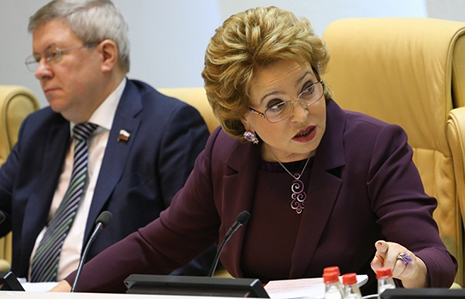In an interview with the government daily Rossiyskaya Gazeta to be published Wednesday, Matviyenko said that “sanctions come and go, but Russia remains.”
She said the position of Western countries complicates life for Russians, but added that “this is not taking place for the first time.” In particular, she recalled the artificially provoked collapse of oil prices in the early 1980s.
Matviyenko stressed that Russia is a strong and self-sufficient country. “On our way there were, are today and will be various difficulties caused by many different reasons, both external and internal,” she said.
“We will have to work tensely if we want to not only preserve Russia but make it head towards new horizons,” the senator said.
The positions of Russia and Western nations and Kiev on the Ukrainian developments differ radically. Russia has repeatedly denied any involvement in the intra-Ukrainian crisis, but the West and Kiev accuse Moscow of “annexing” Crimea and participation in clashes in Ukraine’s war-torn southeast. Western nations have subjected Russia to sanctions.
Ukraine has been in deep crisis since the end of 2013, when then-President Viktor Yanukovich suspended the signing of an association agreement with the European Union to study the deal more thoroughly. The move triggered mass riots that eventually led to a coup in February 2014.
The coup that brought chaos to Ukraine prompted the Republic of Crimea and the city of Sevastopol with a special status to refuse to recognize the legitimacy of coup-imposed authorities, hold a referendum and secede from Ukraine to reunify with Russia in mid-March 2014 after some 60 years as part of Ukraine.
After that, mass protests erupted in Ukraine’s southeast, where local residents, apparently inspired by Crimea`s example, did not recognize the coup-imposed authorities either, formed militias and started fighting for their rights.
Russian officials and companies came under the first batch of Western sanctions, including visa bans and asset freezes, after Russia incorporated Crimea in mid-March 2014 after the February 2014 coup.
Despite Moscow’s repeated statements that the Crimean referendum on secession from Ukraine was in line with the international law and the UN Charter and in conformity with the precedent set by Kosovo’s secession from Serbia in 2008, the West and Kiev have refused to recognize the legality of Crimea’s reunification with Russia.
The West announced new, sectoral, restrictions against Russia in late July 2014, in particular, for what the West claimed was Moscow’s alleged involvement in protests in Ukraine’s southeast.
In response, Russia imposed on August 6, 2014 a one-year ban on imports of beef, pork, poultry, fish, cheeses, fruit, vegetables and dairy products from Australia, Canada, the European Union, the United States and Norway.
New punitive measures against Russia were imposed in September 2014.
Russia has constantly dismissed accusations of “annexing” Crimea, because Crimea reunified with Russia voluntarily after a referendum, as well as allegations that Moscow could in any way be involved in hostilities in the southeast of Ukraine.
Kiev’s military operation designed to regain control over the breakaway Donetsk and Lugansk regions in Ukraine’s southeast on the border with Russia, which call themselves the Donetsk and Lugansk People`s republics, conducted since mid-April 2014, has left thousands of people dead, brought destruction and forced hundreds of thousands to flee.
Businessman and politician Pyotr Poroshenko won the May 25, 2014 early presidential election in Ukraine. Poroshenko had funded anti-government protests that led to the February 2014 coup.
The parties to the intra-Ukrainian conflict agreed on a ceasefire during talks mediated by the Organization for Security and Cooperation in Europe (OSCE) on September 5, 2014 in Belarusian capital Minsk two days after Russian President Vladimir Putin proposed his plan to settle the situation in the east of Ukraine.
Numerous violations of the ceasefire, which took effect the same day, have been reported since.
A memorandum was adopted on September 19, 2014 in Minsk by the Trilateral Contact Group on Ukraine comprising representatives of Ukraine, Russia and the OSCE. The document outlined the parameters for the implementation of commitments on the ceasefire in Ukraine laid down in the Minsk Protocol of September 5.
The nine-point memorandum in particular envisioned a ban on the use of all armaments and withdrawal of weapons with the calibers of over 100 millimeters to a distance of 15 kilometers from the contact line from each side. The OSCE was tasked with controlling the implementation of memorandum provisions.
A "day of silence" in eastern Ukraine began at 09:00 a.m. local time (0700 GMT) on December 9 last year. It was seen as another attempt by both parties to the intra-Ukrainian conflict to put an end to hostilities. Both Kiev and the self-proclaimed republics voiced the necessity to start withdrawal of heavy armaments, swap prisoners and demilitarize the region.
The situation in the region recently deteriorated when a passenger bus bound from Donetsk to Zlatoustovka was shelled on January 13. Twelve civilians were killed and 16 wounded.
More about:















































